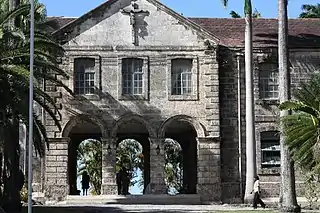Christopher Codrington
Christopher Codrington (1668 – 7 April 1710) was a Barbados-born colonial governor, plantation and slave owner, book collector and soldier.
Christopher Codrington | |
|---|---|
 Detail of Codrington's statue by Henry Cheere in the former Codrington Library, All Souls College, Oxford | |
| Governor of the Leeward Islands | |
| In office 1699–1704 | |
| Personal details | |
| Born | 1668 Barbados |
| Died | 7 April 1710 (aged 41) Barbados |
| Resting place | Saint Michael and All Angels, Bridgetown All Souls Chapel (reburied 1717) |
| Nationality | English |
| Alma mater | Christ Church, Oxford |
| Occupation | Plantation/slave owner, book collector, philanthropist, soldier, politician |
| Military service | |
| Allegiance | |
| Rank | Lieutenant-Colonel |
| Battles/wars | Nine Years' War Attack on Martinique; Namur 1695 War of the Spanish Succession Capture of Saint Kitts; Guadeloupe |
Codrington inherited one of the largest sugar plantations in Barbados. His will endowed the Codrington Library at All Souls College, Oxford; in November 2020 his name was removed from that library as his wealth had been derived from slave labour. He also established Codrington College in Barbados, now part of the University of the West Indies.
Personal details
Christopher Codrington (III) was born in Barbados in 1668, the eldest son of Colonel Christopher Codrington and his wife Gertrude. The Codrington Plantations were one of the largest in Barbados and the family was extremely wealthy. He had a younger brother, who suffered from mental disability.[1]
Codrington never married, although he had a natural mixed-race son, William, from a relationship with Mauldline Morange. William was left £500 in his father's will and became a plantation owner in Jamaica.[2]
Career
Later described by Edmund Burke as "by far ... the most distinguished ornament Barbados ever produced", Codrington was academically talented; educated in England, he studied at Christ Church, Oxford, and was elected to All Souls College in 1690. Part of an intellectual circle that included Charles Boyle and Joseph Addison, he became known as an avid book collector.[3]
In 1693, he returned to the West Indies to take part in an unsuccessful attack on the French possession of Martinique, before serving in Flanders during the Nine Years' War. Having fought with distinction at Huy and Namur, William III gave him a commission as captain in the Foot Guards.[4] This was often a largely honorary post, since only 16 of the nominal 24 companies were actually formed; under the practice known as double-ranking, Guards officers held a second, higher army position and Codrington ranked as a Lieutenant Colonel.[5]
His father died shortly after the Peace of Ryswick ended the Nine Years War in 1697, and he was appointed Governor of the Leeward Islands in 1699. He became embroiled in a number of local disputes and accusations of abuse of power, which were investigated by Parliament. He was exonerated just before the War of the Spanish Succession began in 1702; after successfully retaking Saint Kitts from the French, he resigned after a failed attack on Guadeloupe in 1703, which severely damaged his health. His attempts to re-enter politics proved successful and he spent the rest of his life in retirement on his Barbadian estates.[6]
Legacies

After his death on 7 April 1710, Codrington's body was brought to England and buried on 19 June that year in All Souls Chapel; his will left £10,000 and £6,000 worth of books to endow the Christopher Codrington library in All Souls College, which includes his statue by Sir Henry Cheere. In January 2021, his name was removed from the library due to his association with slave labour, and a plaque was placed outside commemorating those who worked on the Codrington plantations.[7]
His other legacies included £1,500 for a monument to his father in Westminster Abbey, while the Codrington Plantations and part of Barbuda were left to the Society for the Propagation of the Gospel in Foreign Parts to establish a college in Barbados. Delays caused by legal challenges meant that Codrington College was not completed until 1745, and was initially confined to white students.[6] It remains a Anglican theological school and is now part of the University of the West Indies.[8] The Codrington School, first established in 1917 before closing in the 1990s, was reopened in 2002 as an International Baccalaureate school.[9]
References
- Parker 2011, p. 186.
- Parker 2011, pp. 189.
- Parker 2011, pp. 186–187.
- Dalton 1896, p. 66.
- Springman 2008, p. 11.
- Mandelbrote 2020.
- Shaw 2021.
- Codrington College.
- The Codrington School.
Sources
- "Codrington College". Codrington.org. Retrieved 14 January 2021.
- Dalton, Charles (1896). English army lists and commission registers, 1661–1714, Volume IV. Eyre & Spottiswoode.
- Mandelbrote, Scott (2020). "Codrington, Christopher (1668–1710)". Oxford Dictionary of National Biography (online ed.). Oxford University Press. doi:10.1093/ref:odnb/5795. (Subscription or UK public library membership required.)
- Parker, Mathew (2011). The Sugar Barons; Family, Corruption, Empire and War. Windmill Books. ISBN 978-0099558453.
- Shaw, Annie (6 January 2021). "Oxford University's All Souls College drops Christopher Codrington's name from its library". The Art Newspaper. Retrieved 14 January 2021.
- Springman, Michael (2008). The Guards Brigade in the Crimea (2014 ed.). Pen and Sword. ISBN 978-1844156788.CS1 maint: ref=harv (link)
- "The Codrington School; International School of Barbados". The Codrington School. Retrieved 14 January 2021.